Essential Tools of the Trade: Funeral Undertaker Equipment
Funeral undertaker equipment encompasses all specialized tools and supplies used by funeral professionals to provide dignified end-of-life care services. Here's a quick overview of essential categories:
| Equipment Category | Purpose | Examples |
|---|---|---|
| Preparation Room | Body preservation and preparation | Embalming tables, fluid injectors, aspirators |
| Transport | Safe movement of deceased | Mortuary stretchers, cots, body bags, church trucks |
| Refrigeration | Body preservation | Mortuary coolers, walk-in units, body trays |
| Personal Protection | Staff safety | Respirators, gloves, aprons, eye protection |
| Presentation | Viewing and services | Casket displays, church trucks, bier pins |
| Vehicles | Transportation | Hearses, removal vans, roller systems |
The quality and reliability of funeral undertaker equipment directly impacts a funeral home's ability to serve families with dignity and efficiency. From the moment of first call through final disposition, each piece of equipment plays a critical role in maintaining professional standards while ensuring safety for both the deceased and funeral staff.
Modern funeral directors must balance durability, functionality, and budget considerations when selecting equipment. The best tools not only meet immediate operational needs but also adapt to changing requirements, including the increasing demand for bariatric-capable equipment that can support weights of 1,000+ pounds.
I'm Mortuary Cooler, a national-level supplier of mortuary refrigeration systems with extensive experience providing quality funeral undertaker equipment to funeral homes across America. My expertise focuses on helping funeral professionals select equipment that balances performance, compliance, and value.
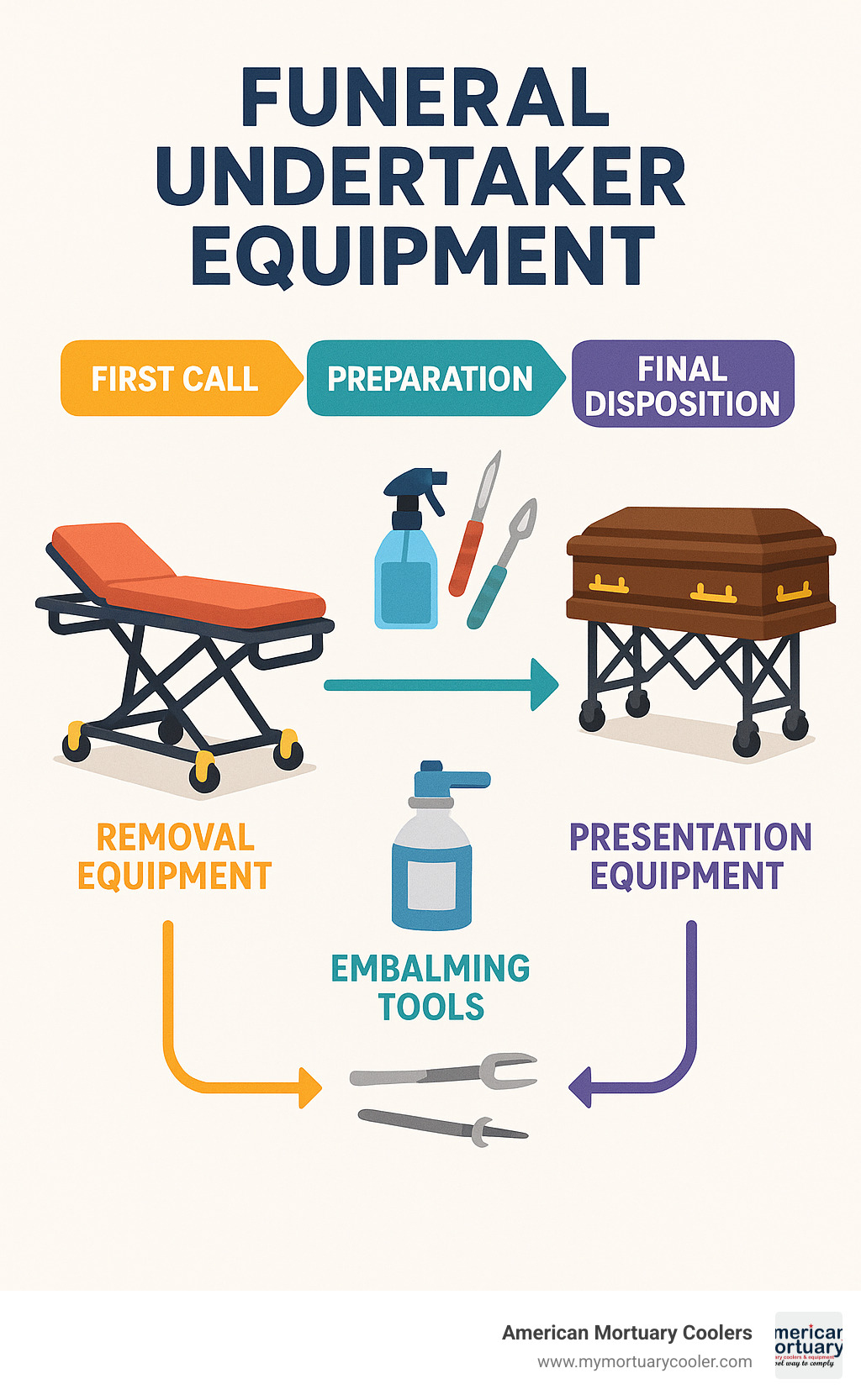
Funeral undertaker equipment word guide:
Funeral Undertaker Equipment: Definition & Core Categories
When we talk about funeral undertaker equipment, we're referring to all those specialized tools and machinery that help funeral professionals provide compassionate, dignified care for the deceased. It's not just about having the right tools—it's about having equipment that honors both the living and those who have passed.
From the moment a funeral home receives that first call about a death to the final moments of disposition, every piece of equipment plays a crucial role in this sacred journey. Quality tools aren't luxury items in this profession—they're essential investments that directly impact public health standards, workflow efficiency, operating costs, and ultimately, a funeral home's reputation in the community.
As one seasoned funeral director with over 25 years in the profession told me recently, "The right equipment isn't just about making our job easier—it's about honoring the deceased and providing families with the assurance that their loved one is being cared for with the utmost respect and professionalism."
Why Funeral Undertaker Equipment Matters
The importance of proper funeral undertaker equipment goes far deeper than you might initially think.
First and foremost, it's about public health protection. Quality equipment with proper drainage systems, sealed preparation rooms, and adequate ventilation prevents disease transmission and protects both staff and visitors. When we invest in proper tools, we're investing in community wellbeing.
Equally important is maintaining dignity for the deceased. From gentle transfer systems to proper refrigeration units, each piece of equipment helps ensure those who have passed are handled with the utmost care and respect they deserve.
There's also the practical matter of operational efficiency. In a profession where timing often matters greatly, having equipment like multi-level mortuary cots, hydraulic lifting systems, and well-designed prep rooms reduces physical strain on staff while improving productivity.
The equipment a funeral home uses also speaks volumes about their professional branding. Families notice the details, even during times of grief. Modern, well-maintained equipment silently communicates a message of professionalism and attention to detail.
Finally, proper equipment helps ensure compliance with the strict regulations governing our industry. From OSHA standards to state health department regulations and NFDA best practices, the right tools help keep funeral homes on the right side of the law.
Scientific research on infection control continues to shape how funeral undertaker equipment is designed, with increasing emphasis on materials that resist bacterial growth and can be thoroughly sanitized.
Main Categories of Funeral Undertaker Equipment
Let me walk you through the essential categories of equipment that make modern funeral service possible:
In the preparation room, you'll find the heart of technical funeral service. This is where embalming tables (both standard and hydraulic), embalming machines, aspirators, drainage systems, and instrument sets come together. Good lighting systems are crucial here too—both overhead and directional—along with all the cosmetic supplies needed for restoration and presentation.
For transport gear, dignity and safety go hand-in-hand. Mortuary cots and stretchers (including specialized bariatric versions), body bags, transfer boards, church trucks, and mortuary lifts all ensure the deceased can be moved respectfully from place to place.
Refrigeration and storage solutions are absolutely essential for preservation. At American Mortuary Coolers, this is our specialty—providing individual mortuary coolers, walk-in units, modular systems, body trays, and temperature monitoring systems custom to each funeral home's specific needs and space constraints. We're proud to deliver these custom solutions directly to funeral homes across the contiguous 48 states.
When it comes to presentation and display, the focus shifts to creating meaningful experiences for families. This category includes casket displays, bier pins, church trucks, register book stands, memory tables, flower displays, and various urn and keepsake options.
Safety equipment and PPE protect the dedicated professionals who serve families daily. This includes respirators with formaldehyde-specific cartridges, chemical-resistant gloves and aprons, face shields, disposable coverings, and proper biohazard disposal systems.
Finally, vehicles and accessories provide the dignified transportation that's been a hallmark of funeral service for generations. Beyond the hearses and limousines, this category includes removal vans, vehicle roller systems, casket securing systems, landau panels, curtains, and floral vase blocks.
For a deeper dive into all the essentials a modern funeral home needs, I recommend our comprehensive guide on Mortuary Must-Haves: A Comprehensive Equipment List. It's a great resource whether you're updating your existing equipment or outfitting a new facility from scratch.
Prep Room Essentials: Tables, Instruments & PPE
The preparation room is the heart of technical operations in any funeral home. This is where embalming, restoration, and other specialized procedures take place, requiring a suite of purpose-built equipment designed for functionality, durability, and compliance with health regulations.
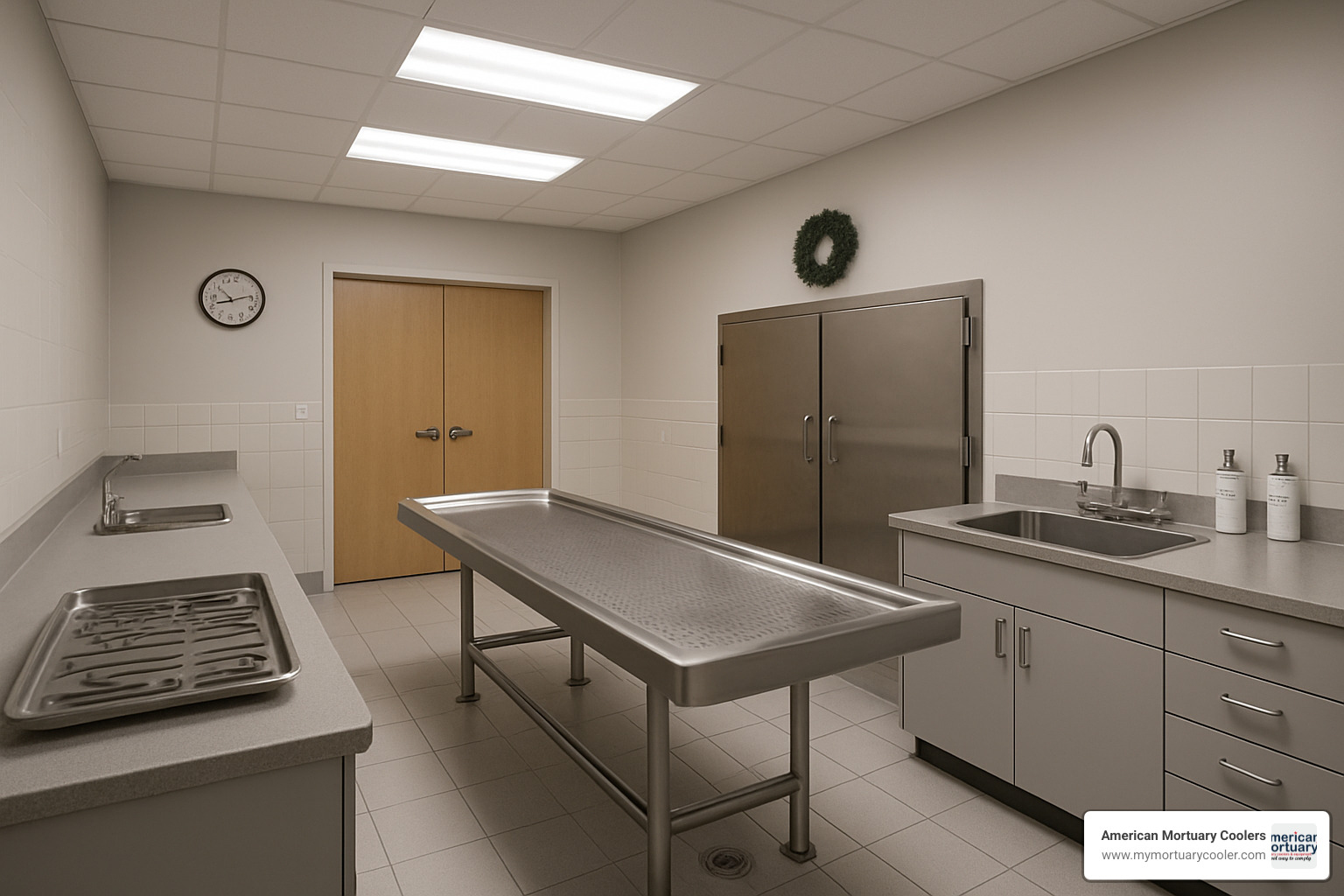
Embalming Tables & Instruments – Picking the Right Fit
Choosing the right embalming table might be one of the most important equipment decisions you'll make for your funeral home. Think of it as the command center of your preparation room – it's where the magic of restoration happens.
Modern embalming tables have come a long way from the basic models of yesteryear. Today's options feature adjustable height mechanisms with hydraulic or electric lift systems that save your back during those long preparation procedures. I've heard countless funeral directors tell me how this simple feature has extended their careers by years.
"We invested in a hydraulic embalming table with foot controls five years ago, and it's been a game-changer for our staff's physical wellbeing," shared a funeral director from Atlanta. "The ability to raise and lower the table has significantly reduced back pain among our team."
Good drainage is non-negotiable in a quality table. Look for integrated drainage systems with a 3" depth and 6" drain stems that efficiently channel fluids away from the body. This keeps your workspace clean and reduces unnecessary mess during procedures.
When it comes to controlling your table, you have options. Foot pedal controls let you adjust the table without using your hands – particularly helpful when you're gloved up and focused on detailed work. Electric controls offer more precise positioning but require careful cleaning between uses.
With America's changing demographics, bariatric support capabilities have become increasingly important. Many funeral homes now invest in tables that can safely support individuals weighing 600 pounds or more. This adaptability ensures you never have to turn away a family due to equipment limitations.
For material, nothing beats industrial-grade stainless steel (typically 14-gauge 304 stainless) for its corrosion resistance and ease of cleaning. The best tables feature reinforced corners and welds that stand up to years of daily use.
Beyond the table itself, your preparation room needs a carefully selected array of instruments. Quality arterial tubes and cannulas in various sizes ensure proper fluid distribution during embalming. Scalpels, surgical scissors, forceps, and hemostats allow for precise tissue manipulation, while specialized tools like aneurysm hooks and trocar equipment support cavity embalming procedures.
For a deeper dive into selecting the right embalming equipment for your funeral home, check out our comprehensive Ultimate Guide to Comparing Embalming Machines.
Personal Protective Equipment for Mortuary Staff
Safety isn't just a regulatory requirement in the preparation room – it's an ethical commitment to your staff's wellbeing. The proper funeral undertaker equipment includes comprehensive PPE that protects against the unique hazards of mortuary work.
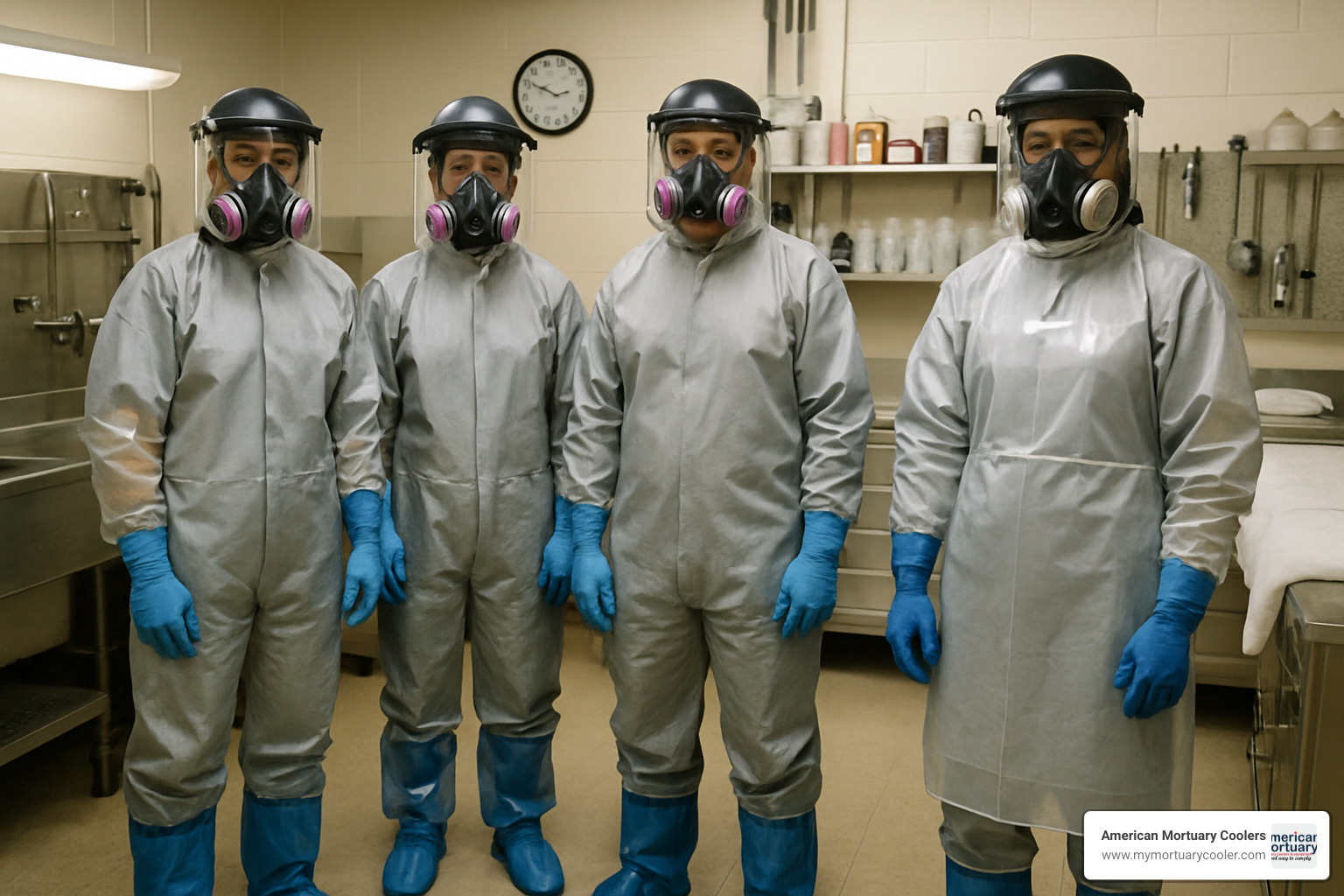
Your respiratory protection should start with half-mask respirators equipped with formaldehyde-specific cartridges (like the 3M 8247 or equivalent). For procedures with higher exposure risk, full-face respirators provide additional protection for your eyes and face. Always ensure your filters are NIOSH-approved and appropriate for mortuary chemicals.
Body protection begins with quality chemical-resistant aprons or full coveralls. Many funeral professionals prefer plastic unionalls (available from infant to 4XL sizes) for comprehensive coverage. For arm protection, plastic sleeves prevent exposure during fluid-intensive procedures.
Your hands deserve special attention since they're your most important tools. Nitrile examination gloves work well for routine procedures, but consider the double-gloving technique when working with particularly challenging cases. Don't forget cut-resistant gloves when handling sharp instruments – a small investment that can prevent serious injuries.
Eye protection is critical in the prep room. Safety glasses with side shields provide basic protection, while full face shields guard against unexpected splashes. Many professionals prefer respirators with integrated eye protection for convenience and comprehensive coverage.
Even your feet need protection in this environment. Fluid-resistant shoe covers or dedicated footwear for the preparation room prevent tracking potentially hazardous materials into other areas of your facility.
According to MortuaryMall.com, which has served funeral professionals since 1873, proper PPE creates a culture of safety that protects staff and maintains the integrity of the preparation process. It's not just about following regulations – it's about creating an environment where your team can focus on providing dignified care without worrying about their own health.
At American Mortuary Coolers, we understand that the preparation room is where technical excellence meets compassionate care. That's why we're committed to helping funeral professionals select equipment that balances performance, safety, and value – creating spaces where the important work of remembrance can begin.
Body Transport & Storage Solutions
The safe, dignified transport and proper storage of the deceased are fundamental responsibilities in funeral service. From the moment of first call to final disposition, specialized equipment ensures respectful handling while protecting the health and safety of funeral professionals.
Transport Equipment Essentials
Mortuary Stretchers and Cots:
The foundation of removal and transport equipment begins with mortuary cots. These specialized stretchers are designed specifically for the funeral industry with features that include:
- Multi-level adjustment capabilities that allow for various height positions during transport
- Collapsible designs for easy loading into removal vehicles
- Wheel systems designed for stability and maneuverability in tight spaces
- Securing straps to ensure the deceased remains properly positioned
The Ferno Model 24 Multi-Level One Man Mortuary Cot is particularly popular among funeral homes for its versatility and ease of use. According to industry data, these professional-grade cots typically have a service life of 10-15 years with proper maintenance, making them a long-term investment.
Transfer Aids:
Complementing stretchers are specialized transfer aids that assist in moving the deceased with minimal physical strain:
- EZ Slider transfer boards facilitate lateral transfers from bed to cot
- MegaMover Removal and Transport Units feature 14 handles and support up to 1000 pounds, allowing multiple staff members to share the weight during difficult removals
- T-Strap arm and hand positioners help maintain proper positioning during transfers
Body Bags and Pouches:
Quality body bags are essential for safe, dignified transport:
- Standard PVC body bags (8 mil thickness) typically support up to 400 pounds
- Heavy-duty reinforced bags (15 mil thickness) can accommodate up to 1000 pounds
- Leak-proof construction with reinforced zippers ensures containment
- Handle designs facilitate lifting and carrying
Mortuary Refrigeration and Storage Systems
Proper refrigeration is critical for preservation between removal and final disposition. The options range from individual units to comprehensive walk-in systems:
Individual Mortuary Coolers:
Single-body refrigeration units offer flexibility for smaller facilities:
- Temperature-controlled environments typically maintained at 35-40°F
- Individual access to each deceased without disturbing others
- Space-efficient designs for facilities with limited square footage
At American Mortuary Coolers, we design custom individual units that can be configured to fit unusual spaces while maintaining optimal cooling performance.
Walk-In Refrigeration Systems:
Larger funeral homes often require walk-in coolers:
- Capacity for multiple bodies on racks or trays
- Energy-efficient cooling systems with temperature monitoring
- Custom-designed layouts to maximize available space
- Optional humidity control for improved preservation
Body Trays and Roller Systems:
Within refrigeration units, specialized storage systems organize and facilitate access:
- Stainless steel body trays (typically 23" width) provide durable, sanitizable surfaces
- Roller rack systems in side-load or end-load configurations allow easy access
- Knock-down designs facilitate cleaning and transport when needed
- Multi-tier configurations maximize vertical storage space
For detailed guidance on selecting appropriate cooling equipment, see our article on A Practical Guide to Choosing Mortuary Cooling Equipment.
Funeral Vehicles & Accessories
Specialized vehicles and their accessories form a critical link in the transport chain, ensuring dignified movement from the funeral home to the final resting place.
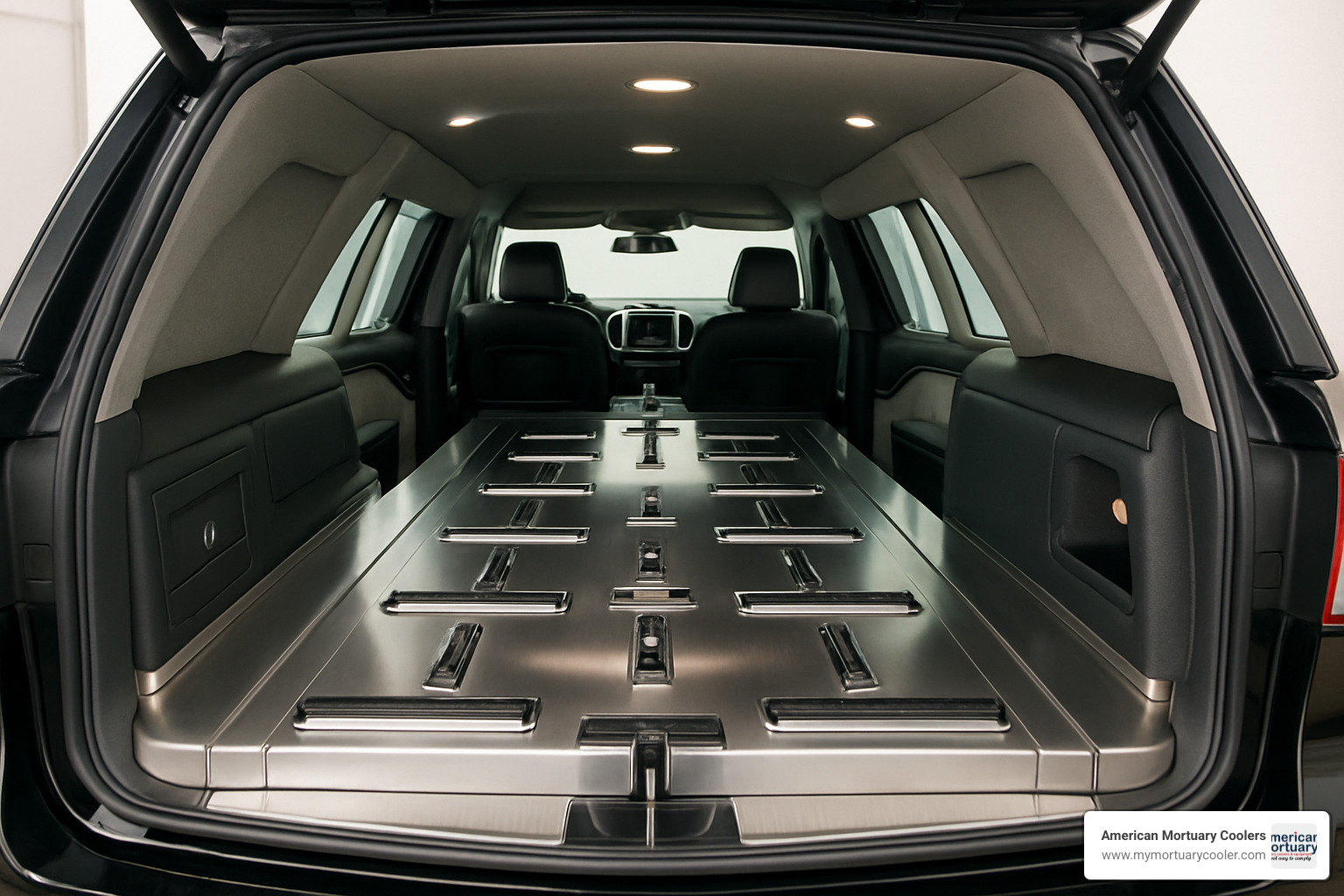
Essential Vehicle Equipment:
-
Bier Pins and Securing Systems:
- Adjustable pins secure caskets during transport
- Quick-release mechanisms allow for efficient loading/unloading
- Compatible designs work with various casket styles
-
Roller Systems and Transport Floors:
- Integrated roller assemblies facilitate smooth casket movement
- K2 Standard Folding Transport Floors provide flexible loading options
- Skid bars and glide strips reduce friction during transfers
-
Landau Panels and Drapery:
- Decorative panels maintain the traditional appearance of funeral vehicles
- Custom curtains and window treatments ensure privacy
- Coordinated interior designs reflect the funeral home's branding
-
Floral Accessories:
- Vase blocks (available in 5, 6, or 8-hole configurations) secure floral arrangements
- Non-slip surfaces prevent movement during transport
- Quick-release designs facilitate setup and removal
According to industry professionals, investing in quality vehicle accessories not only improves functionality but also improves the perceived value of services provided to families.
Bariatric & Oversized Case Equipment
The increasing need for equipment capable of handling larger individuals has driven significant innovation in the funeral industry. Specialized bariatric equipment ensures dignity for all while protecting staff from injury.
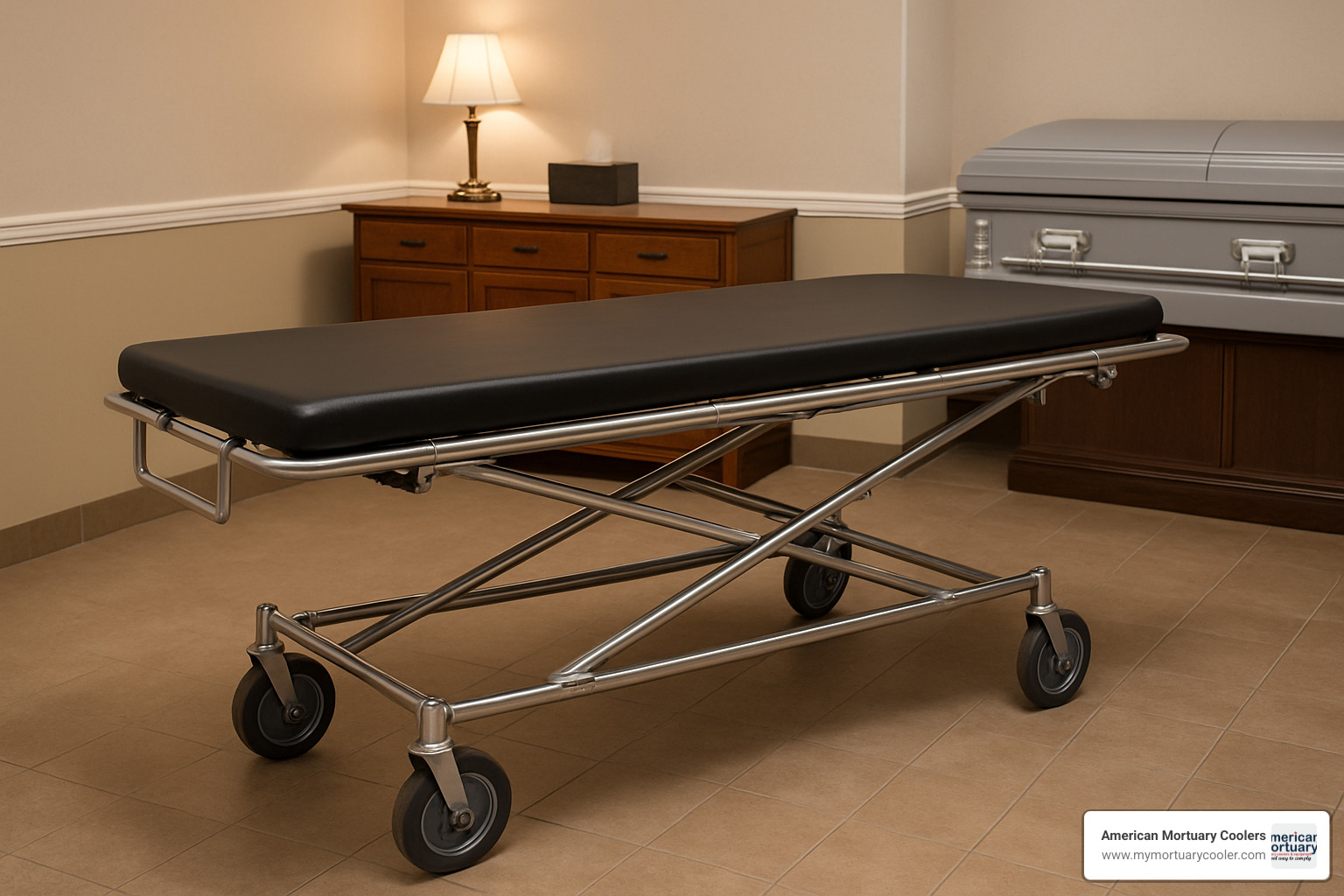
Specialized Bariatric Equipment:
-
High-Capacity Stretchers:
- Reinforced frames support 1,000+ pounds
- Wider surfaces accommodate larger individuals
- Improved wheel systems for stability under heavier loads
- The Ferno Model 24-MAXX Multi-Level Mortuary Cot is specifically designed for bariatric cases
-
Reinforced Body Bags:
- Heavy-duty PVC construction (15 mil vs. standard 8 mil)
- Additional handles for team lifting
- Reinforced zippers and seams prevent failure under stress
- Wider dimensions accommodate larger individuals
-
Mortuary Lifts:
- Electric and hydraulic systems reduce manual handling
- Scissor-lift designs offer precise positioning
- Battery-powered options provide flexibility in various settings
- Digital scales allow for accurate weight measurement
For more information on selecting appropriate lifting equipment, see our guide on Mortuary Lifting Equipment: Your Ultimate Buying Guide.
Comparison of Standard vs. Bariatric Mortuary Cots:
| Feature | Standard Multi-Level Cot | Bariatric Multi-Level Cot |
|---|---|---|
| Weight Capacity | 400-500 lbs | 1,000+ lbs |
| Width | 23-24 inches | 28-30 inches |
| Frame Construction | Aluminum | Reinforced aluminum or steel |
| Wheel System | Standard | Heavy-duty with additional support |
| Collapse Mechanism | Single-operator | Often requires two operators |
| Approximate Cost | $1,300-$1,700 | $2,200-$3,500 |
| Weight of Cot | 45-60 lbs | 75-90 lbs |
"Having dedicated bariatric equipment isn't just about handling weight—it's about providing equal dignity to every family we serve, regardless of the size of their loved one," explains a funeral director from our Dallas service region.
Innovations, Safety, Costs & FAQs
The funeral industry has come a long way in recent years, with funeral undertaker equipment evolving to meet changing needs and expectations. Today's tools blend traditional respect with modern innovation, making life easier for funeral professionals while enhancing the services they provide to families.
Recent Innovations in Funeral Equipment
The days of purely mechanical funeral equipment are behind us. Today's preparation rooms feature impressive technology that would have seemed like science fiction just a decade ago.
Battery-powered lift systems have revolutionized the way we handle transfers and removals. These cordless marvels offer complete flexibility, with digital displays showing precise weight measurements (incredibly helpful for casket selection). The rechargeable lithium-ion batteries last through multiple cases, and the reduced physical strain means fewer back injuries among staff.
"I remember when we first got our battery-powered lift," shares a funeral director from our Chicago service area. "The difference was night and day. Not only could we handle heavier cases more safely, but the digital weight display eliminated all the guesswork."
Touch-screen embalming machines represent another leap forward. These sophisticated systems allow for precise control of fluid pressure and flow through intuitive digital interfaces. Many models offer programmable settings for different embalming techniques, and some even include data logging for documentation. When issues arise, remote diagnostic capabilities mean faster resolution without waiting days for a technician visit.
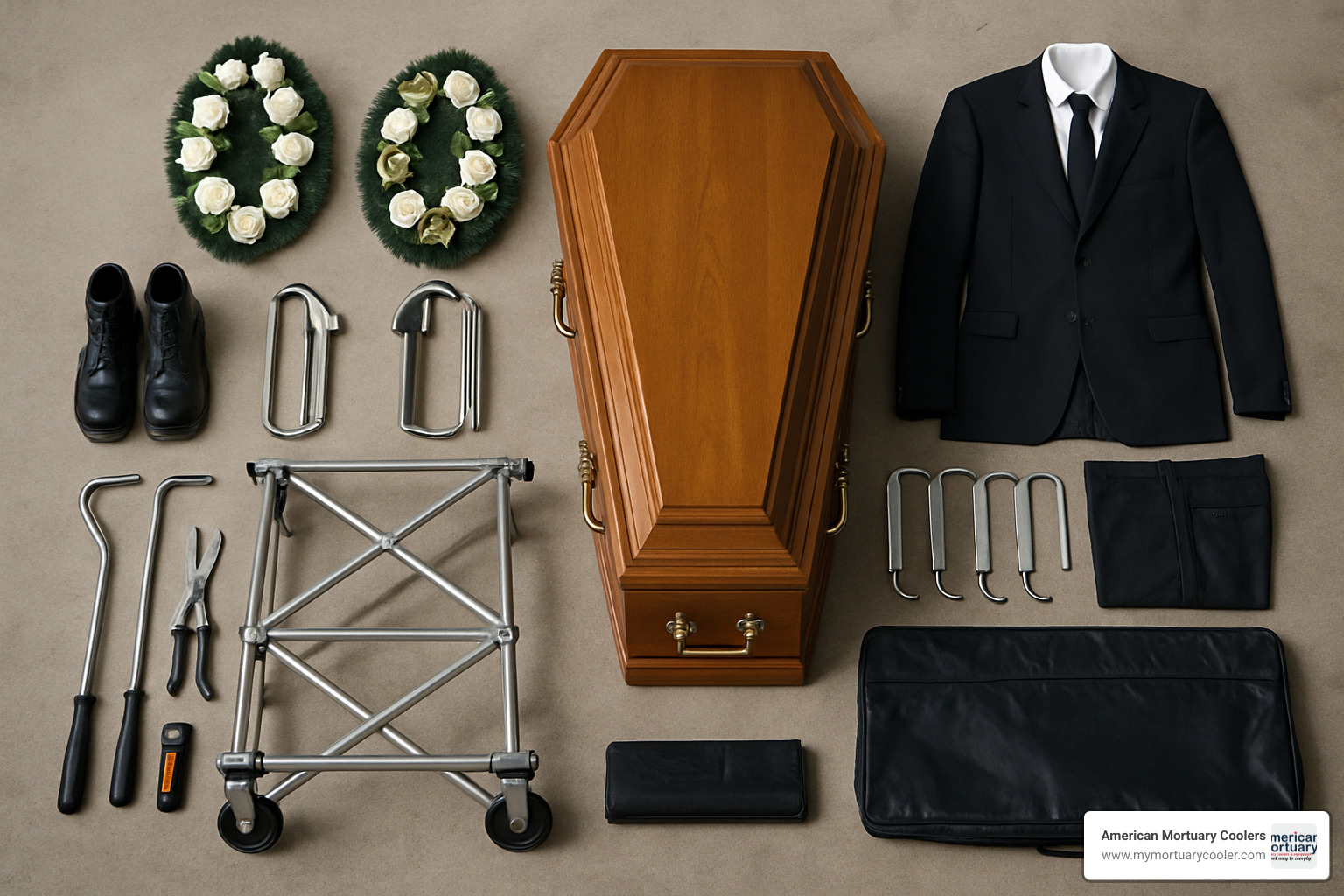
Environmental consciousness has also reached the preparation room with eco-friendly preservation options. Formaldehyde-free embalming fluids reduce chemical exposure for staff while supporting families seeking greener options. Biodegradable body bags complement green burial choices, and energy-efficient refrigeration systems lower both environmental impact and monthly utility bills.
Perhaps most impressive are the new remote monitoring refrigeration systems. These smart coolers maintain constant vigilance over temperature conditions, sending smartphone alerts if anything goes awry. Cloud-based data logging provides documentation for compliance purposes, while energy management features reduce operational costs. Some systems even offer predictive maintenance alerts that can prevent equipment failures before they happen.
Safety, Compliance & Best Practices
Keeping staff safe and operations compliant isn't just about following rules—it's about creating a culture where quality and safety become second nature.
OSHA compliance forms the foundation of preparation room safety. Modern ventilation systems now exceed formaldehyde exposure limits, protecting embalmers from harmful chemicals. Proper sharps disposal systems prevent needle-stick injuries, while equipment designed with ergonomics in mind reduces physical strain. Of course, documented training on all equipment remains essential for both safety and liability protection.
The National Funeral Directors Association (NFDA) sets standards that guide equipment selection and usage. Funeral homes participating in the NFDA's Pursuit of Excellence program often choose equipment that supports these higher standards, with documentation systems that demonstrate their commitment to professional excellence.
For funeral homes seeking the highest levels of quality management, ISO 9001 considerations come into play. These include standardized operating procedures for all equipment, continuous improvement processes, and rigorous quality management systems for equipment maintenance.
Maintenance isn't glamorous, but it's essential for equipment longevity. Best practices include regular inspection schedules for all mechanical equipment, documented cleaning protocols for infection control, preventative maintenance programs, and regular calibration of precision instruments. A little attention today prevents major headaches tomorrow.
Cost Considerations & Financing Options
Quality funeral undertaker equipment represents a significant investment, but fortunately, today's funeral directors have more acquisition options than ever before.
Direct purchases with warranty protection remain popular for funeral homes with available capital. Many suppliers offer volume discounts for multiple-item acquisitions, and trade-in programs can offset the cost of equipment upgrades. Savvy funeral directors often coordinate with colleagues for bulk ordering to reduce shipping costs on larger items.
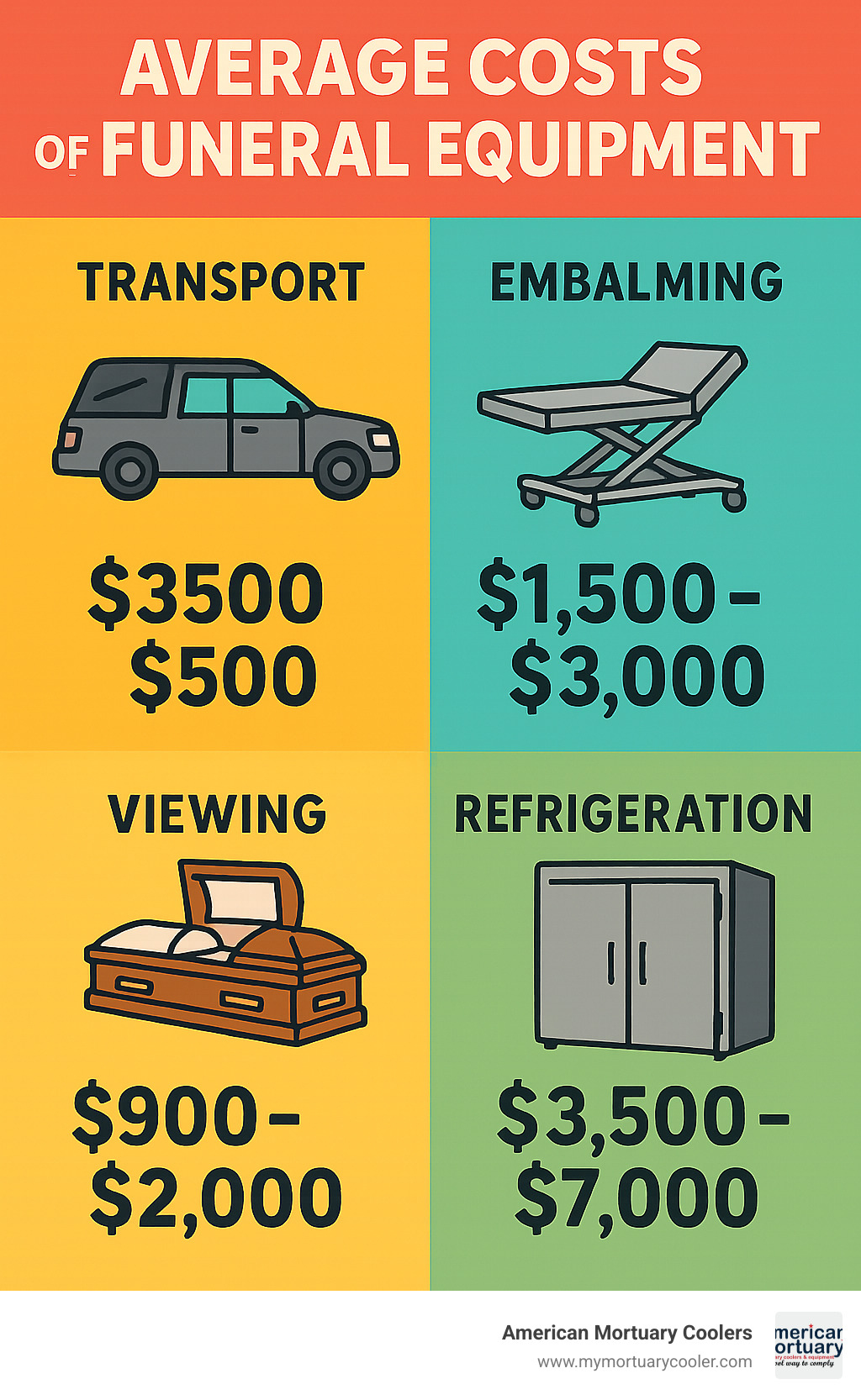
For those preserving capital, financing alternatives make premium equipment accessible. Equipment-specific loans offer competitive terms custom to funeral businesses, while leasing programs allow for regular upgrades as technology evolves. Many suppliers offer installment payment plans (we've all seen those "3 payments of $995" offers), and SBA loans provide another avenue for funeral business equipment acquisition.
Smart funeral directors also consider the tax implications of equipment purchases. Section 179 deductions can significantly reduce the effective cost of new equipment, while depreciation schedules help spread the tax benefits over time. Some states offer specific tax incentives for small businesses, and energy-efficient refrigeration may qualify for additional credits.
For financial processing solutions that can help manage equipment purchases, Merchant Services options integrate seamlessly with most funeral home management software.
Want to learn more about the tools used in modern funeral service? Check out our detailed article on Tool Talk: A Deep Dive into Mortuary Tools.
Frequently Asked Questions about Funeral Undertaker Equipment
Q: What financing options are available for high-ticket items like embalming tables and refrigeration units?
A: Most major suppliers offer several financing paths. These typically include 30-day terms for NAFD or SAIF registered companies, equipment leasing programs with flexible terms, and installment payment plans. At American Mortuary Coolers, we work with customers to develop payment plans that align with their business cash flow, particularly for our custom refrigeration solutions.
Q: What maintenance practices will keep my equipment compliant with health regulations?
A: The key is consistency. Daily sanitization of all surfaces that contact the deceased forms the foundation. Add weekly deep cleaning of preparation room equipment, monthly inspection of mechanical components, quarterly testing of ventilation systems, and annual professional servicing of refrigeration equipment. Maintaining detailed logs of all these activities provides documentation if questions ever arise.
Q: How do I plan for future capacity needs when purchasing refrigeration equipment?
A: Think beyond today's needs. We recommend calculating your current case volume plus 25-30% for growth, then considering seasonal fluctuations in death rates and community demographics. Don't forget to include space for bariatric accommodations. Our team at American Mortuary Coolers specializes in helping funeral directors project future needs and design scalable refrigeration solutions that grow with their business.
Q: What are the essential differences between hydraulic and electric embalming tables?
A: Each has distinct advantages. Hydraulic tables use foot pedals for hands-free operation but may require more maintenance over time. Electric tables offer more precise positioning but require hand controls (which means touching switches after handling the deceased). Hydraulic systems typically have fewer components that can fail, while electric tables generally provide smoother, quieter operation. Both systems typically support 500+ pounds, with specialized bariatric models available for larger cases.
Q: How often should PPE be replaced in the preparation room?
A: Different items have different lifespans. Respirator cartridges should be replaced according to manufacturer guidelines or whenever you detect chemical odors (whichever comes first). Disposable gloves need changing between cases and immediately if torn or contaminated. Protective clothing should be replaced at the first sign of damage, while reusable face shields should be cleaned after each use and replaced if scratched. Regular inspection of all PPE should become part of your preparation room routine.
Conclusion
Selecting the right funeral undertaker equipment isn't just about having the proper tools—it's about honoring the deceased and supporting families during their most vulnerable moments. Every piece of equipment, from preparation tables to transport systems, plays a crucial role in delivering dignified, professional service while keeping your staff safe.
Here at American Mortuary Coolers, we've walked alongside funeral professionals across the country, listening to their unique challenges and crafting solutions that truly work. Our Tennessee-based team takes pride in designing mortuary refrigeration systems that stand the test of time—built with the durability to withstand daily use and the efficiency that keeps your operational costs manageable.
"We don't just sell coolers," as our founder often says, "we provide peace of mind." That peace comes from knowing your equipment won't let you down when families are counting on you most.
What sets us apart is our commitment to customization. We understand that no two funeral homes are identical—your space constraints, case volume, and community needs are uniquely yours. That's why we design each refrigeration system to fit your specific requirements, then deliver it directly to your doorstep anywhere in the contiguous 48 states.
The funeral profession continues to change with new technologies, evolving family expectations, and updated regulations. By investing in quality funeral undertaker equipment today, you're positioning your business to meet these challenges with confidence. Equipment purchases aren't just expenses—they're investments in your reputation and operational excellence.
Whether you're building a new facility from the ground up, renovating your current space, or simply replacing aging equipment, the choices you make now will impact your service quality for years to come. We encourage you to look beyond the initial price tag to consider longevity, performance, and the support you'll receive after installation.
As one of our long-time customers in Mississippi told us, "The right equipment fades into the background, letting us focus entirely on the families we serve—and that's exactly as it should be."
For more information about our refrigerated solutions and how they can improve your funeral home operations, visit More info about refrigerated solutions.
We're ready when you are—because in this profession, being prepared is everything.

















